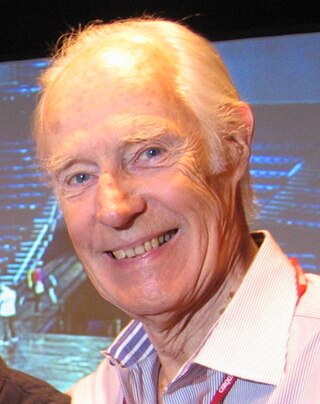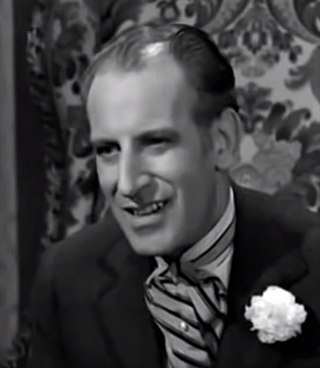
Beyond the Fringe was a British comedy stage revue written and performed by Alan Bennett, Peter Cook, Jonathan Miller, and Dudley Moore. It debuted at the 1960 Edinburgh Festival and went on to play in London's West End and then in America, both on tour and on New York's Broadway in the early 1960s. Hugely successful, it is widely regarded as seminal to the "satire boom", the rise of satirical comedy in 1960s Britain.

Sir George Henry Martin was an English record producer, arranger, composer, conductor, and musician. He was commonly referred to as the "Fifth Beatle" because of his extensive involvement in each of the Beatles' original albums. AllMusic has described him as the "world's most famous record producer". Martin's formal musical expertise and interest in novel recording practices complemented the Beatles' rudimentary musical education and relentless quest for new musical sounds to record. Most of the Beatles' orchestral arrangements and instrumentation were written or performed by Martin, and he played piano or keyboards on a number of their records. Martin's collaboration with the Beatles resulted in popular, highly acclaimed records with innovative sounds, such as the 1967 album Sgt. Pepper's Lonely Hearts Club Band—the first rock album to win a Grammy Award for Album of the Year.

Flanders and Swann were a British comedy duo and musicians. Michael Flanders (1922–1975) was a lyricist, actor, and singer. He collaborated with Donald Swann (1923–1994), a composer and pianist, in writing and performing comic songs. They first worked together in a school revue in 1939 and eventually wrote more than 100 comic songs together.

Michael Henry Flanders was an English actor, broadcaster, and writer and performer of comic songs. He is best known for his stage partnership with Donald Swann.

Donald Ibrahim Swann was a British composer, musician, singer and entertainer. He was one half of Flanders and Swann, writing and performing comic songs with Michael Flanders.

A revue is a type of multi-act popular theatrical entertainment that combines music, dance, and sketches. The revue has its roots in 19th century popular entertainment and melodrama but grew into a substantial cultural presence of its own during its golden years from 1916 to 1932. Though most famous for their visual spectacle, revues frequently satirized contemporary figures, news or literature. Similar to the related subforms of operetta and musical theatre, the revue art form brings together music, dance and sketches to create a compelling show. In contrast to these, however, revue does not have an overarching storyline. Rather, a general theme serves as the motto for a loosely-related series of acts that alternate between solo performances and dance ensembles.

Rose-Marie is an operetta-style musical with music by Rudolf Friml and Herbert Stothart, and book and lyrics by Otto Harbach and Oscar Hammerstein II. The story is set in the Canadian Rocky Mountains and concerns Rose-Marie La Flemme, a French Canadian girl who loves miner Jim Kenyon. When Jim falls under suspicion for murder, her brother Emile plans for Rose-Marie to marry Edward Hawley, a city man.

"The Gnu" is a humorous song about a talking gnu by Flanders and Swann.

Max Adrian was an Irish stage, film and television actor and singer. He was a founding member of both the Royal Shakespeare Company and the National Theatre.
The Experimental Theatre Club (ETC) is a student dramatic society at the University of Oxford, England. It was founded in 1936 by Nevill Coghill as an alternative company to the Oxford University Dramatic Society (OUDS), and produces several productions a year.
Ian Bryce Wallace OBE was an English bass-baritone opera and concert singer, actor and broadcaster of Scottish extraction.

The Temperance Seven is a British band originally active in the 1960s, specialising in 1920s-style jazz music. They were known for their surreal performances.
The Lord Chamberlain's requirements were a set of four prerequisites for a licence for a production in British theatres. These were printed in theatre programmes so the audience could be aware of them. The Lord Chamberlain's Office had control of theatres until 1968, including censorship of the production content as well as for logistical matters. In the 1980s, they were replaced by similar requirements applied by a local licensing authority.
Alexander H. Cohen was an American theatrical producer who mounted more than one hundred productions on both sides of the Atlantic. He was the only American producer to maintain offices in the West End as well as on Broadway.

At the Drop of Another Hat is a musical revue by Flanders and Swann, similar in format to its long-running predecessor, At the Drop of a Hat (1956). In the show, they both sang on a nearly bare stage, accompanied by Swann on the piano. The songs were linked by contemporary social commentary, mostly by Flanders. Highlights included "Ill Wind", in which Flanders sings rapidly about a pilfered horn to the tune of the Rondo from Mozart's Horn Concerto No. 4 and "New Built Up Area", a soliloquy by Flanders in which a disgruntled resident of Salisbury Plain complains of the newly erected Stonehenge.

"Have Some Madeira M'Dear", also titled "Madeira, M'Dear?", is a darkly comic song by Flanders and Swann.
Fresh Airs was a revue produced by Laurier Lister that opened in Brighton in 1955. It was the last in his series of "Airs" revues before Flanders & Swann started performing for themselves in At the Drop of a Hat.

Pepe Jaramillo was a notable Mexican pianist, composer, arranger, and recording artist. He was most active in London as an EMI recording artist in the 1960s and 1970s. Born in Lerdo, Durango, he began his professional music career playing in night clubs in México City. Relocating to London in the late 1950s, his many recordings and worldwide concert appearances brought him international fame. He died in his sleep of anemia at his villa in Spain.
Airs on a Shoestring was a British musical revue, first staged at the Royal Court Theatre in London on 22 April 1953.

The Best of Sellers is the first studio album by the English actor, comedian and singer Peter Sellers. Released as a 10-inch LP on EMI's Parlophone label in December 1958, the album has been cited as "the first British comedy LP created in a recording studio". Sellers plays all of the roles, satirising the British class system and rock and roll, and the album represented an artistic breakthrough for producer George Martin. Despite initial concerns about its commercial viability from EMI, The Best of Sellers was a major success, receiving critical acclaim and reaching number three in the UK Albums Chart.














